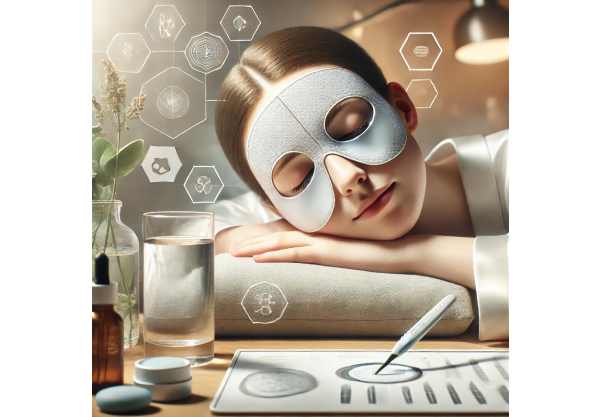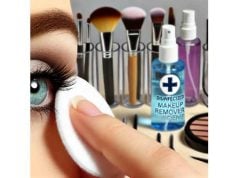Understanding Eye Puffiness: Causes and Concerns
Waking up to puffy eyes can feel like an unwelcome start to your day. Those swollen, tired-looking eyes not only affect your appearance but can also be uncomfortable. Whether it’s from a late-night, an allergic reaction, or simply genetics, eye puffiness is a common issue that many people face at some point. The delicate skin around the eyes is particularly susceptible to swelling, and while it’s often harmless, it can be frustrating to deal with. Understanding the underlying causes of eye puffiness is the first step towards effectively reducing it and restoring a refreshed, youthful appearance.
Effective Strategies for Reducing Eye Puffiness
1. Understanding the Causes of Eye Puffiness
Before diving into the methods to reduce puffiness, it’s important to identify what might be causing the issue. The skin around the eyes is incredibly thin and delicate, making it prone to swelling due to a variety of factors. Common causes include:
- Fluid Retention: This is one of the most common reasons for puffiness. It can occur due to high salt intake, alcohol consumption, or sleeping in certain positions that cause fluid to accumulate under the eyes.
- Allergies: Allergic reactions can lead to inflammation and swelling around the eyes, often accompanied by itching or redness.
- Lack of Sleep: Not getting enough sleep can lead to fluid retention around the eyes, as well as the development of dark circles, making the puffiness more noticeable.
- Aging: As we age, the tissues around the eyes, including some of the muscles supporting the eyelids, weaken. This can cause fat to move into the lower eyelids, making them appear puffy.
- Genetics: Some people are more prone to puffy eyes due to hereditary factors.
By understanding these causes, you can tailor your approach to reducing puffiness more effectively. For instance, if allergies are the culprit, managing those with appropriate medication can significantly reduce swelling.
2. Immediate Remedies for Eye Puffiness
When you wake up with puffy eyes, you often want to reduce the swelling as quickly as possible. There are several immediate remedies that can help alleviate puffiness and restore a more refreshed appearance:
- Cold Compresses: Applying a cold compress to the eyes is one of the quickest and most effective ways to reduce swelling. The cold temperature constricts blood vessels and reduces fluid retention. You can use a clean, cold washcloth, chilled spoons, or even specialized eye masks designed for this purpose. Place the cold compress on your closed eyelids for about 10-15 minutes for optimal results.
- Cucumber Slices: The classic remedy of placing cucumber slices on the eyes works due to the cooling and astringent properties of cucumbers. They also contain antioxidants that can help soothe the skin. Simply place chilled cucumber slices over your eyes for about 10 minutes.
- Tea Bags: Both green and black tea bags contain caffeine and antioxidants, which can help reduce puffiness by improving circulation and reducing fluid build-up. After brewing, chill the tea bags in the refrigerator, then place them on your closed eyelids for 10-15 minutes.
- Gentle Eye Massage: Massaging the area around your eyes can help stimulate lymphatic drainage and reduce fluid retention. Use your ring finger to gently tap and massage the skin around your eyes in circular motions. Be careful not to tug or pull on the delicate skin.
- Elevating Your Head During Sleep: Sleeping with your head slightly elevated can help prevent fluid from pooling under your eyes. Use an extra pillow or a wedge to keep your head raised while you sleep.
These quick remedies can provide temporary relief from puffiness, making them ideal for use when you need to look your best on short notice.
3. Long-Term Solutions and Preventative Measures
While immediate remedies are helpful, addressing eye puffiness in the long term involves making lifestyle changes and adopting a consistent skincare routine. Here are some strategies to consider:
- Hydration and Diet: Staying hydrated is crucial for preventing fluid retention. Drinking plenty of water helps flush out excess salt from your system, reducing puffiness. Additionally, a diet low in sodium and rich in fruits and vegetables can prevent puffiness. Potassium-rich foods, like bananas and leafy greens, help balance fluid levels in the body.
- Adequate Sleep: Ensuring you get enough sleep is one of the best ways to prevent puffiness. Aim for 7-9 hours of quality sleep each night. Establishing a regular sleep schedule, avoiding screens before bedtime, and creating a restful sleep environment can all contribute to better sleep quality.
- Managing Allergies: If allergies are contributing to your puffiness, managing them effectively is key. This can include taking antihistamines, using air purifiers to reduce allergens in your home, and avoiding known allergens. Additionally, keeping your bedding clean and free from dust mites can reduce allergic reactions that lead to puffy eyes.
- Skincare Routine: Incorporating the right products into your skincare routine can help minimize puffiness over time. Look for eye creams and serums that contain ingredients like caffeine, hyaluronic acid, and peptides, which can help reduce swelling and improve skin elasticity. Apply these products gently, using your ring finger to tap them into the skin around your eyes.
- Protecting Your Skin: Sun damage can exacerbate puffiness and lead to premature aging around the eyes. Always wear sunscreen, even on cloudy days, and consider using sunglasses to protect the delicate skin around your eyes from UV rays.
By adopting these long-term strategies, you can minimize the occurrence of puffy eyes and maintain a more youthful, refreshed appearance.
Special Considerations and When to Seek Professional Help
1. Recognizing When Eye Puffiness Requires Medical Attention
While eye puffiness is usually a cosmetic concern, there are instances where it could indicate a more serious underlying condition. If you experience persistent puffiness that doesn’t respond to home remedies or is accompanied by other symptoms, it may be time to consult a healthcare professional.
- Sudden Onset of Puffiness: If you notice sudden or severe puffiness, particularly if it’s only in one eye, this could be a sign of an infection or other medical issue. Conditions like conjunctivitis (pink eye), orbital cellulitis, or a stye can cause localized swelling and should be evaluated by a doctor.
- Pain or Discomfort: Puffiness accompanied by pain, redness, or discharge could indicate an infection or inflammation that requires medical treatment.
- Persistent Puffiness: If puffiness is constant and doesn’t improve with lifestyle changes or over-the-counter remedies, it could be a sign of an underlying health issue such as thyroid eye disease, kidney problems, or a sinus condition. A healthcare provider can help diagnose and treat the root cause.
2. Cosmetic Procedures for Persistent Puffiness
For those who have tried various remedies and lifestyle changes with limited success, cosmetic procedures might be an option to consider. These procedures can offer more permanent solutions for persistent puffiness, particularly if it’s due to aging or genetic factors.
- Blepharoplasty: This surgical procedure involves removing excess skin and fat from the eyelids, which can reduce puffiness and rejuvenate the eye area. It’s a common procedure for those with severe or persistent puffiness due to aging.
- Dermal Fillers: Injectable fillers can help smooth out under-eye bags and improve the appearance of puffiness. This is a non-surgical option that can provide immediate results, though the effects are temporary and typically last several months.
- Laser Therapy: Laser treatments can tighten the skin and reduce puffiness by stimulating collagen production. This option is less invasive than surgery and can provide noticeable improvements with minimal downtime.
Before considering any cosmetic procedures, it’s important to consult with a qualified professional to discuss the risks, benefits, and expected outcomes.











